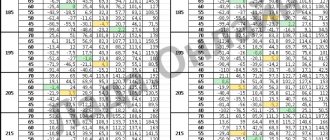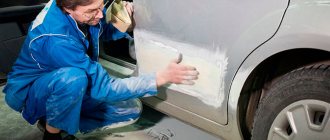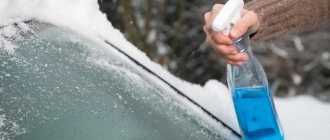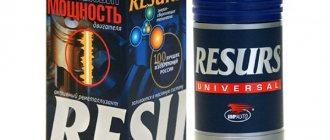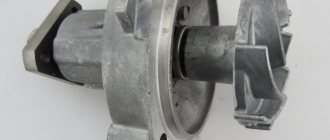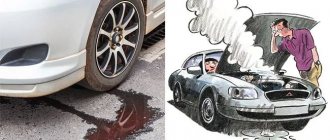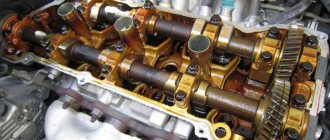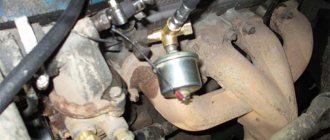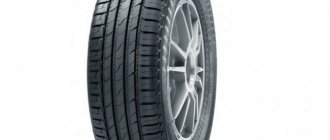Car radiator sealant allows you to get rid of leaks in the engine or heater cooling system. With its help, you can eliminate a small leak in “field conditions” when the car owner does not have the opportunity to carry out a full repair with the replacement of individual elements of the corresponding cooling and heating systems.
When choosing a good radiator sealant, you need to consider the following aspects:
- its type (there are powder, liquid and polymer);
- scope and restrictions on use;
- the time between pouring sealant into the system and eliminating the leak;
- the relationship between price, quality, volume of product in packaging;
- reviews from car owners about certain antifreeze sealants, both positive and negative.
Below will be a rating of the most popular products, based on reviews and tests of various radiator sealants. If you have personal experience using liquid or powder radiator sealant, we would be glad to hear your opinion on this matter in the comments.
| Diameter of the "tightened" hole | BBF Super | Liqui Moly | K-Seal | Hi-Gear | Gunk | Fill Inn |
| Time for complete closure of calibrated holes, sec | ||||||
| 0.3 mm | 20 | 30 | 75 | 35 | 154 | 126 |
| 0.5 mm | 85 | 62 | 115 | 96 | 224 | 612 |
| 0.7 mm | 124 | 88 | 315 | 345 | 245 | 292 |
| 1.0 mm | 146 | 118 | 380 | 630 | 218 | n/a |
Fillinn
Claimed, Russia , ordered and supervised by PRIDE USA
Approximate price: 60 rub.
White emulsion. It looks like it's polymer. It comes loose easily and begins to act immediately after entering the tank. I was unable to heal a 1 mm hole; I managed to heal the rest, but not quickly. The level of residual deposits is high.
+ Relatively cheap composition.
- In case of serious damage, it may not save.
5th–6th place. Cooling system sealant Gunk Radiator Sealer Super
What affects the temperature of the engine?
The normal functioning of the motor largely depends on the degree of heating. Normal temperatures are maintained thanks to the cooling circuit. Correct operation of the engine is possible if the system is tight and in good working order. However, the circuit often leaks.
If damage appears at joints or on rubber parts, repair involves replacing them.
A leak in the cylinder head is considered more complex. In this case, the coolant level decreases and the engine begins to overheat.
GUNK Radiator Sealer Super
Declared manufacturer: USA
Approximate price: 160 rub.
The thick brown emulsion works effectively and relatively quickly; holes of different diameters closed almost simultaneously. But there were a lot of deposits left after it. On old and dirty radiators this can be dangerous.
+ Works quickly and efficiently.
— Relatively high level of residual deposits.
4th place. Composition for repairing radiators and cooling systems Hi-Gear Stop Leak (Gold Formula)
How to flush a radiator from sealant
As mentioned above, the use of sealant leads to the formation of plaque in the car’s cooling system on the internal surfaces of its components, which interferes with its normal operation. The consequence of this is the need to clean the system from contaminants using special means. There are several types of them, including the so-called folk, homemade and factory-made.
Please note that proper cleaning of the cooling system will reveal damage that was sealed with sealant. Therefore, after cleaning, it will be necessary to carry out a full repair of the system by replacing damaged components or soldering them.
Thus, folk cleaning products include citric acid, acetic acid, the famous Fanta drink, lactic acid, whey, caustic soda. You can also dissolve the radiator sealant using factory-made products, which are currently abundant on the market. Some of the most popular are LAVR Radiator Flush Classic, Hi-Gear Radiator Flush, LIQUI MOLY Kuhler-Reiniger. They effectively clean the radiator and other elements of the cooling and heating system. Please read the operating instructions carefully before using them.
Hi-Gear Stop Leak (Gold Formula)
Declared manufacturer: USA
Approximate price: 190 rub.
The blue-green fibrous substance, after stirring, healed the holes in a strange way - the leaks either stopped or started again. Complete closure of the holes occurred after the antifreeze had left the expansion tank: it had to be topped up. As a result, even the drain hole was “healed”!
+ High efficiency, forms plugs even in large holes.
— It works quite slowly and spasmodically. Relatively high level of residual deposits.
3rd place. Cooling system sealant K-Seal
Possible problems
It happens that the sealant turns out to be of low quality or completely fake, so instead of sealing the crack you can get:
- clogging of thin radiator pipes;
- violation of engine cooling, overload and breakdown;
- clogging of the radiator stove, disruption of the interior heating;
- failure of the pump, thermostat.
To prevent this from happening, you need to purchase sealing compounds from reliable manufacturers, after consulting with the seller, and apply them strictly according to the instructions. This will help to temporarily solve the problem of radiator leaks and get to a repair shop without consequences.
K-Seal
Declared manufacturer: USA
Approximate price: 430 rub.
The thick brown emulsion is declared to be “long-lasting” and does not require subsequent replacement of parts. Contains copper powder that forms durable plugs. It works quite effectively, but healing of large holes is slow. But there are very few deposits.
+ Low level of residual contamination.
— The most expensive drug in our sample.
2nd place. Liqui Moly Cooling System Sealant
Bizol
This brand of sealant is best suited for systems made of aluminum. It qualitatively eliminates depressurization factors, isolating the leak area. The dispersant is manufactured in Germany, and its cost is slightly higher than similar sealants.
Features of sealing mixtures for Bizol cooling systems:
- Increased operational safety.
- Reducing flow in older cooling systems.
- Increased engine life.
- No environmental pollution.
Reference! This composition prevents a decrease in oil viscosity, which allows reducing their consumption in diesel and gasoline engines.
Liqui Moly
Declared manufacturer: Germany
Approximate price: 200 rub.
Metal-containing drug. The sediment after draining shone with sparkles of all colors. A clear leader in the speed of sealing holes, and the leaks, having stopped, never resumed. The level of residual deposits is average.
+ Best operating efficiency.
- Price.
1 place. Radiator sealant “BBF Super”
Pros and cons of using
Automotive radiator sealants have clear advantages, and the most important of them is the ability to get to a repair shop, keeping the engine from overheating. They are ideal as an emergency measure when calling a tow truck is not possible. There is no need to coat the radiator walls with sealants; they are simply poured into the system, which is very quick and convenient.
However, sealant is only a temporary solution. Any product clogs the system to varying degrees, reduces its efficiency, and reduces the service life of components. Therefore, it is necessary to flush the radiator as soon as possible to remove residual sealant and sediment. In any case, this is cheaper than replacing engine parts, which will have to be done after it overheats. Another disadvantage is the inability to repair too large holes: in some cases, mechanical repairs have to be made immediately.
"BBF Super"
Declared manufacturer: Russia
Approximate price: 55 rub.
The white emulsion works classically - it consistently and relatively quickly closes the holes from smaller to larger. There are very few residual deposits. After opening, neat fungi of polymer plugs are visible in the place of the holes. And at the same time - the cheapest composition among those tested!
+ The best price/quality combination. Lowest sediment level.
- Not detected.
Final table (click to open full size):
Recommendations for use
Despite the different compositions and brands, the principle of using sealants is the same in most cases.
An example algorithm looks like this:
- if the engine is hot, let it cool a little;
- open the radiator cap;
- pour or pour the composition inside in the amount prescribed by the manufacturer;
- turn on the engine;
- let the car engine run for the specified number of minutes;
- turn off the engine;
- Check to see if the antifreeze has stopped leaking.
Of course, such a composition cannot give a 100% guarantee, so it is possible that when using the sealant the leak will remain. And here there are different options:
- instructions for using funds were violated;
- the dimensions of the holes in the radiator are too large and the sealant cannot cope with them;
- the composition itself turned out to be ineffective.
Since the sealant gives only a temporary result, in the near future after filling it is necessary to find an opportunity to carry out repairs or replacement.
Is it possible to eliminate leaks in the cooling system yourself? And what consequences can you expect?
Sealants: combating turnover
Wurst
Wurst sealant is suitable for closed systems. It helps in sealing joints with large gaps. Fills all cracks efficiently, protecting against corrosion and rust.
Characteristics:
- No hazardous substances in the composition.
- Resistance to aggressive substances, fuels, oils, alkalis.
- Precise dosage, easy one-handed application.
- Possibility of operating the system half an hour after application.
- Application for different types of surfaces.
- Low ductility at high temperatures.
Varieties
Among the wide variety of products for this purpose, it is difficult to say which is better and which is worse.
Depending on the state of aggregation, radiator sealants are divided into 2 large categories. This is a liquid and powder version of production.
Powder ones are considered the simplest. They are objectively inferior in all respects to their liquid counterparts. In fact, the powder for sealing holes in the radiator acts in a similar way to the dry mustard described above. The substance gradually absorbs moisture and liquid, after which it swells and closes leaking areas.
But the drug can only cope with small cracks and breakdowns. At the same time, it heavily pollutes the cooling system. The only advantage is the low price.
Much more loyal attitude on the part of consumers towards liquid sealants. Between liquid and dry (powder) you can definitely determine your favorite. Only in the most extreme cases, when it is not possible to visit a service station and buy a sealing liquid, take the powder.
The liquids themselves have different compositions. This allows us to divide them into 3 subspecies.
The following types of liquid-type sealants are distinguished:
- Polymer. The basis of this substance is small metal particles. Once inside the cooling system, they react with oxygen, cover the hole and the hardening process begins. In terms of cost, these are the most expensive formulations;
- Silicone. The most common liquids. They are characterized by excellent strength and elasticity parameters. The liquid is able to effectively penetrate various joints and crevices. It is important to use when the damage is small but difficult to reach;
- Polyurethane. They are rare, although they are characterized by a high level of elasticity and adhesion. They are not afraid of temperature changes. The most expensive in the price range.
However, you should not think that such funds cost a lot of money. In addition, sealants are purchased literally once. Then it lies somewhere in the glove compartment for a long time, until the very moment comes when you have to use the product.
Action
The principle of operation is quite simple. Hi-Gear radiator sealant with liquid gets into the leak and hardens. At the same time, it is not washed out or dissolved, thereby preventing further leakage.
The hardened sealant is not affected by high temperatures and vibrations. Many of them are comparable in strength to welding, and metal-ceramic ones are able to eliminate the most severe leaks by forming a durable plug. When exposed to air, they can expand.
How are silicone pipes better than rubber ones?
The pipes are very simple in appearance. But their role is important, the result of the entire working system will depend on it. Therefore, motorists and service station employees always choose this type of rubber products with the utmost care, devoting no less time to them than to spare parts for the engine or those suitable for the brake system.
Means for the prevention of the cooling system
Preventive agents can be used before each antifreeze change. They usually help prevent contamination and improve heat exchange. The main thing is to choose products with a minimum amount of residual substances, otherwise you can only harm the system.
Liqui Moly
This product is excellent for prevention after each coolant change. The composition helps prevent damage by removing dirt and scale. This is a universal product that can be used for any cooling system.
Key features of Liqui Moly radiator cleaner:
- High-quality sealing of leaks and cracks for a long time.
- Can be used for aluminum systems.
- Versatility, use with different antifreezes.
- No detrimental effect on system elements.
- Quick and independent troubleshooting using clear instructions.
Before using this product, shake the can well. The mixture is poured at the rate of 500 ml per 20 liters of antifreeze. After filling, you need to let the engine idle. The composition can remain in the system until the end of the coolant's service life.
Lavr
The sealant helps to cope with scale and oil stains. Regular use of the product prevents the appearance of plaque. Safe, can be used for different types of car cooling systems.
Characteristics of the radiator cleaner:
- Contains polymers and fibers to bond crack edges.
- Can close gaps up to 2 mm in a few minutes.
- Resistant to high temperatures up to 80 degrees.
- Does not create sediment, does not accumulate plaque on the system.
- Can be stored in the car all year round without freezing.
Bizol
This professional product is widely used for complete cleansing of various deposits. The composition has proven itself as a universal sealant for removing scale, corrosion, and grease. Can be combined with any antifreeze and clean water.
Video
A malfunction is not as rare as a leaking radiator pipe, which in most cases, if you do a little analysis, lies on the conscience of the owner himself. The rubber pipe has a multilayer structure and is also designed for fairly high temperatures.
Therefore, nothing can happen at once with a serviceable, let’s say yesterday, pipe. Something must have preceded this, to which the owner or technician servicing the car paid little attention. Advice from experienced drivers is always designed to prevent an emergency situation even in the last case; they give advice on how to get out of it with dignity, while preserving the engine.
Reviews from car owners
You can find many reviews on the Internet about liquid radiator sealants. Opinions are very different. For some they turned out to be useless and even harmful, for others they helped for a short period, and for others they extended the life of the radiator by hundreds of kilometers.
“My work colleague filled himself with one of these, and in the end everything got so clogged in the radiator that the engine overheated, and I had to rebuild it.”
“I poured into Tavria, and in the end I changed two thermostats and the radiator.”
“For two years this slurry was bubbling around in my cooling system. Shuts everything down. Based on the results, I replaced the heater radiator, thermostat, and main radiator.”
“I filled it in and did everything according to the instructions. But I did not get the desired and expected result. Or rather, the effect was somehow too fleeting and temporary. It felt like for the first two or three days the flow had really stopped. But then it turned out to be zilch and self-deception. The leak continued with greater force.”
“I was pouring liquid sealant, there was a leak in the area of the heater radiator. Nothing happened, I fixed the leak.”
“I myself used Liqui, nothing clogged and the leak disappeared. The only thing is that over time it came back and I had to rebuild the system. So this remedy is more preventative.”
“It works quite well and hardly clogs the channels. True, there is a thin coating from it on the walls. The mileage with the sealant is almost 300 km, still no hint of a leak.”
“I wanted to buy a powder, but a friend recommended a liquid sealant. I poured it in and after 30 minutes there was no leak. My brother has been driving like this for six months now, the antifreeze doesn’t go away.”
